
Information to change the world | |
Find Topics, Titles, Names related to your query |

Information to change the world | |
Find Topics, Titles, Names related to your query |
|
|
Marxism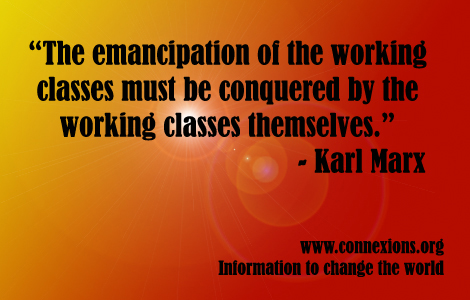 This page is a gateway to resources about Marxism compiled by Connexions. You’ll find some articles and books, as well as a handful of quotes, which provide an introduction to various aspects of Marxism. The Connexions website has many more articles and books on Marxism and related topics in addition to the ones shown below. You can find them using the Subject and Author indexes, or the Search engine. For in-depth research, you might also want to check out the Marxists Internet Archive, the largest multi-language collection of Marxist documents online. To find books and articles on the Connexions website written by Karl Marx or Friedrich Engels, the Author index is a good place to start. Go to the M page for Marx and the E page for Engels. The Subject Index is a good tool for finding articles and books about various aspects of Marxism. Here are some of the most relevant Subject Index pages: Selected Articles & BooksThere are many, many different views and interpretations of Marxism. Marxism is a way of critically studying and trying to change the world, a world which is itself constantly changing. Karl Marx himself was constantly deepening and modifying his views in response to new struggles and new information. He saw orthodoxy as the antithesis of critical analysis. In his own lifetime, Marx was so exasperated by pedantic admirers who even then were trying to proclaim a “Marxist” orthodoxy that he exclaimed “If anything is certain, it is that I myself am not a Marxist.”
Overviews The Two Souls of Socialism: Socialism from Above vs. Socialism from Below Hal Draper traces the historical evolution of the socialist idea. He identifies two sharply different conceptions of socialism: one which seeks to impose a just society from above; the other which holds that socialism can only result from struggles 'from below', that is, by people working together to liberate themselves. Marx’s greatest contribution, says Draper, was to unite the idea of democracy with the idea of socialism, insisting that there could be no democracy without socialism, and no socialism without democracy. What is Marxism? In this chapter from A Marxist History of the World, Neil Faulkner presents a brief exposition of the historical roots of Marxism, and its significance. Why I am a Marxist and Leading Principles of Marxism In these two essays, Karl Korsch outlines his view of the key features of Marxism and what he considers are the most effective points of Marxist theory and practice: those specific attitudes, propositions, and tendencies which can be usefully adopted as the guide to our thoughts and action as we try to change the world. Seeds of Fire: Birth of Karl Marx, May 5, 1818 A short reflection on Karl Marx and the essentials of his life, by Ulli Diemer. Theory and practice: an introduction to Marxian theory An introduction to Marxist theory by Paul Mattick, from the journal Root and Branch. Reading the “unreadable” Marx Many who have not read Marx have heard that he is ‘unreadable,’ but in this article Humphery McQueen celebrates the colour and humour of Marx’s writing, the use of metaphor, paradox, pun, irony, classical allusion and all the devices of the writer’s art. Adventures in Marxism (book) In this book of essays, Marshall Berman explores and rejoices in the emancipatory potential of Marxism. Dance of the Dialectic: Steps in Marx’s Method (book) For Bertell Ollman, Marx’s method was his message: “By allowing Marx to focus on the interconnections that constitute the key patterns in capitalism, the dialectic brings the capitalist system itself, as a pattern of patterns, into ‘sight’ and makes it something real that requires its own explanation”. Why Marx Was Right (book) Terry Eagleton tackles common objections to Marxism and demonstrates how and why they are wrong. Critique of Capitalism and Political Economy A Contribution to the Critique of Political Economy This essay by Karl Marx presents an overview of his critique of political economy. The preface to this essay is perhaps Marx’s most succinct summary of his approach to political economy. Back to Marx Ellen Meiksins Wood argues that this historical moment, the one we’re living in now, is the best not the worst, the most not the least appropriate moment to bring back Marx. She says that this is the moment when Marx should and can come fully into his own for the first time – not excluding the historical moment when he actually lived. Fictitious Capital for Beginners: Imperialism, “Anti-Imperialism”, and the Continuing Relevance of Rosa Luxemburg Rosa Luxemburg’s framework, writes Loren Goldner, enabled her to see how capitalism could ultimately destroy society ... a prophecy we see materializing before our eyes today. Marx’s Ecological Notebooks This article investigate Marx’s natural-scientific notebooks. Marx’s notebooks allow us to see clearly his interests and preoccupations before and after the publication of the first volume of Capital in 1867, and the directions he might have taken through his intensive research into disciplines such as biology, chemistry, geology, and mineralogy, much of which he was not able fully to integrate into Capital before his death. Marxism as if the planet mattered Karl Marx and Friedrich Engels held that capitalism inevitably tears apart the natural conditions that sustain life. They argued capitalism’s exploitation of working people, and the unsustainable exploitation of nature, were linked and part of the same process. Marxism and Ecology: Common Fonts of a Great Transition Socialist thought, says John Bellamy Foster, is re-emerging at the forefront of the movement for global ecological and social change. Marx and Nature: A Red and Green Perspective (book) Marx insists that production as a social and material process is shaped and constrained by natural conditions. Paul Burkett shows that it is Marx’s overriding concern with human emancipation that impels him to approach nature from the standpoint of materialist history, sociology, and critical political economy. For a discussion of Burkett’s book, see Martin Empson’s review. Land & Labour: Marxism, Ecology and Human History (book) Explores humanity’s contradictory relationship with the environment: our role in destroying nature, and our potential to for positive change. For a discussion of the book, see this review. Capital, Volume 1: A Critical Analysis of Capitalist Production (book) Karl Marx was only able to complete Volume 1 of Capital before he died. Volumes 2 and 3 were completed by Friedrich Engels using Marx’s unfinished drafts and notes. Capital is a difficult book, made more daunting by the fact that the first chapter is particularly theoretical and technical. For someone considering reading Capital, it is worth bearing in mind that there is no law that says you have to read the whole thing from beginning to end. Marx himself suggested, in a letter, that rather than start at the beginning of Capital, a reader could start off with Chapter 10, on the Working Day, and then move on to Chapter 13, on Co-operation, and then to Chapter 14, Division of Labour and Manufacture, and then on to Chapter 26, Primitive Accumulation. Karl Korsch, in his Introduction to Capital, suggests the reader start with Chapter 7, then skim chapters 8 and 9, and then read Chapter 10. There are also many articles, essays, and books commenting on and explaining Capital. A few of them are listed below:. Introduction to Capital Karl Korsch writes that “Marx grasps and portrays the totality of the capitalist mode of production, and the bourgeois society that emerges from it. He describes and connects all its economic features, together with its legal, political, religious, artistic, and philosophical – in short, ideological – manifestations. This comprehensiveness is a necessary consequence of the dialectical mode of description.” Scaling the wall: what to do if you get stuck while reading Marx’s Capital Lots of people who start Karl Marx’s Capital get stuck somewhere in the early chapters of Volume 1. Here are some suggestions about how to get unstuck and read the whole book. Introduction to Marx’s Capital (book) David Harvey wrote this book with the aim of guiding the first time reader through the text and making Capital relevant to the understanding of contemporary capitalism. Reading Capital Politically (book) Harry Cleaver offers a practical, political interpretation of Marx’s Capital. Politics, Society, State, and Revolution Marx on Democratic Forms of Government Marx’s socialism (communism) as a political programme may be most quickly defined as the complete democratization of society, not merely of political forms, says Hal Draper. For Marx, the fight for democracy was a leading edge of the socialist effort; an integral part of it all. The Communist Manifesto Written in 1848 by Karl Marx and Friedrich Engels as the theoretical and practical platform of the Communist League, a workers’ association. Tearing Away the Veils: The Communist Manifesto A commentary on the Communist Manifesto and its relevance to the twenty-first century, by Marshall Berman. The Civil War in France Karl Marx’s analysis of the revolutionary Paris Commune of 1871. Critique of the Gotha Program Karl Marx’s incisive criticisms of the programme adopted by congress to unite the two German socialist parties in 1875. In highly compressed form, this is a key formulation of Marx’s views of socialism and the state. Introduction to the Critique of the Gotha Program Karl Korsch explains the significance of Marx's Critique of the Gotha Program. Of all Karl Marx’s shorter works, says Korsch, this is the most lucid and forceful expression of the bases and consequences of his economic and social theory. The Death of the State in Marx & Engels Surveys the thinking of Marx and Engels on the “dying-away” of the state in socialist (communist) society. For a Critical Marxism Michael Löwy emphasizes the open quality of the Marxist world view, in contrast with the conventional caricature of a closed, dogmatic system. For responses to Löwy's essay, see On Criticizing Marx by Ernie Haberkern and On Marxism and Method by Martin Glaberman. Marx rediscovered: A review of Heather A Brown, Marx on Gender and the Family: A Critical Study A review of a book on Marx’s views on women’s oppression. I Am a Woman and a Human: A Marxist-Feminist Critique of Intersectionality Theory Eve Mitchell looks at the history of identity politics and intersectionality theory in effort to construct a Marxist critique of intersectionality theory, and offer positive Marxist conception of feminism. Is Marxism Eurocentric? One objection to Marxism is that it originated two centuries ago in Europe – so what could it have to say to the world’s oppressed today? Lance Selfa has an answer. Marxism and “Subaltern Studies” A review, by Adaner Usmani, of Vivek Chibber’s book Postcolonial Theory and the Specter of Capital. Karl Marx and the Iroquois Franklin Rosemont delves into Marx’s Ethnological Notebooks and examines their significance and relevance towards today's communist movement. Bakunin vs. Marx An examination of some of the most common anarchist misconceptions about Marxism, focusing especially on the authoritarian and conspiratorial ideas and practice of the anarchist writer Mikhail Bakunin. Marx, theoretician of anarchism Maximilien Rubel argues that under the name communism, Marx developed a theory of anarchism; and further, in fact it was he who was the first to provide a rational basis for the anarchist utopia and to put forward a project for achieving it. Karl Marx’s Theory of Revolution: Volume I: State and Bureaucracy (book) A wide-ranging and thorough exposition of Marx’s views on democracy. Karl Marx’s Theory of Revolution: Volume II: The Politics of Social Classes (book) Examines the development of the thought of Marx and Engels on the role of classes in society. Reform and Revolution (book) Rosa Luxemburg's challenge to the reformism that was undermining the socialist movement. “It is contrary to history,” she writes, “to represent work for reforms as a long-drawn out revolution and revolution as a condensed series of reforms. A social transformation and a legislative reform do not differ according to their duration but according to their content.” Democracy Against Capitalism (book) Ellen Meiksins Wood provides an explication and defense of the key theoretical concepts relevant to socialism, understood to be the most radical social and economic democracy. The History of Democracy: A Marxist Interpretation (book) Brian S. Roper traces the history of democracy from ancient Athens to the emergence of liberal representative and socialist participatory democracy. He argues that democracy cannot be understood separately from the social and economic contexts in which democratic states operate. Marx at the Margins: On Nationalism, Ethnicity, and Non-Western Societies (book) Kevin B. Anderson explains that Marx’s critique of capital was far broader than is usually supposed. To be sure, he concentrated on the labour-capital relation within Western Europe and North America. But at the same time, he expended considerable time and energy on the analysis of non-Western societies, as well as race, ethnicity, and nationalism. For a rdiscussion of Marx at the Margins, see this review. Socialism and Communism Yes, There is an Alternative! A review of Marx’s Concept of the Alternative to Capitalism A review of Peter Hudis’ book Marx’s Concept of the Alternative to Capitalism (see below). Marx’s Concept of the Alternative to Capitalism (book) In contrast to the traditional view that Marx’s work is restricted to a critique of capitalism – and that he consciously avoided any detailed conception of its alternative – this work by Peter Hudis shows that Marx was committed to a specific concept of a post-capitalist society which informed the whole of his approach to political economy. Karl Marx’s Theory of Revolution: Volume IV: Critique of Other Socialisms (book) Much of Karl Marx’s most important work came out of his critique of other thinkers, including many socialists who differed significantly in their conceptions of socialism. Hal Draper looks at these critiques to illuminate what Marx’s socialism was, as well as what it was not. Quotations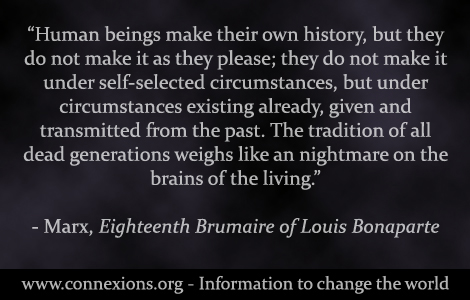  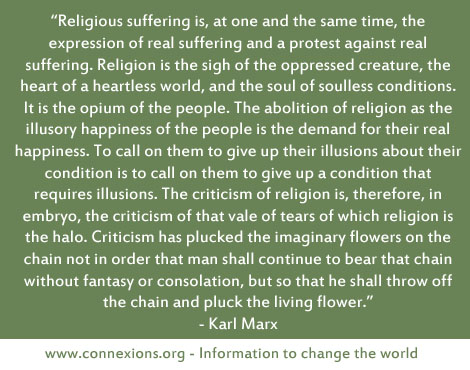 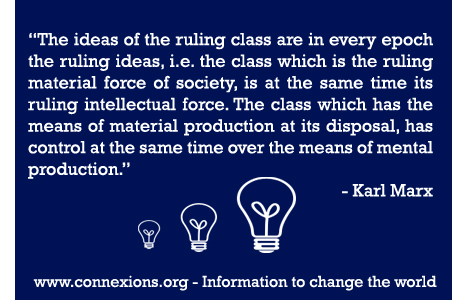 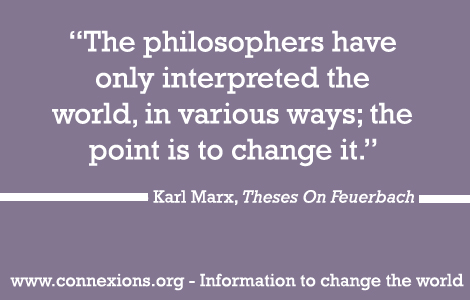 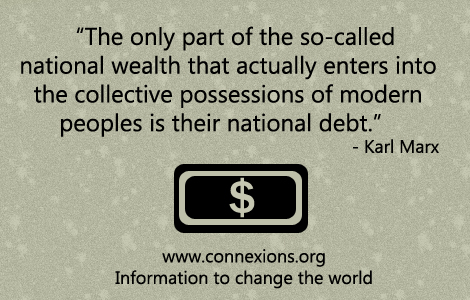   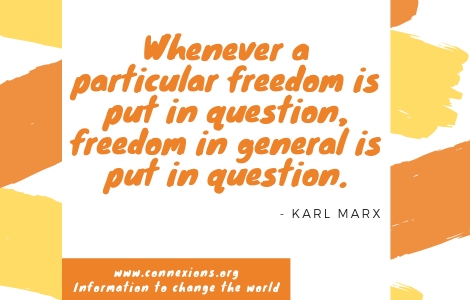 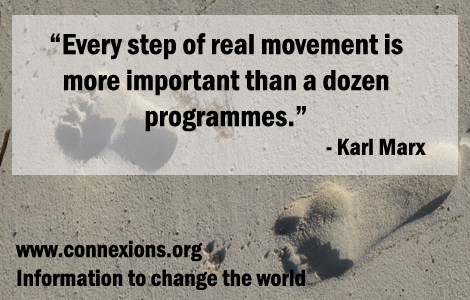 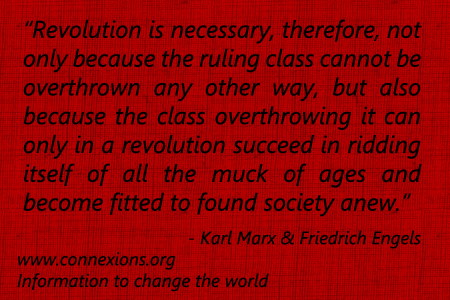 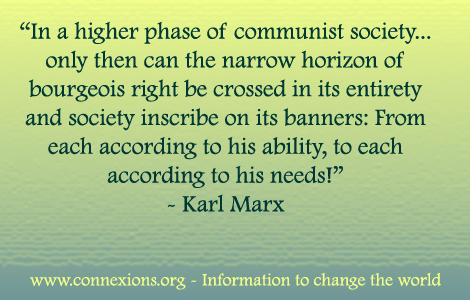  “The human being is in the most literal sense a political animal, not merely a gregarious animal, but an animal which can individuate itself only in the midst of society. Production by an isolated individual outside society ... is as much of an absurdity as is the development of language without individuals living together
and talking to each other.” “Society does not consist of individuals, but expresses the sum of interrelations, the relations within which these individuals stand.” “No social order is ever destroyed before all the productive forces for which it is sufficient have been developed, and new superior relations of production never replace older ones before the material conditions for their existence have matured within the framework of the old society. Mankind thus inevitably sets itself only such tasks as it is able to solve, since closer examination will always show that the problem itself arises only when the material conditions for its solution are already present or at least in the course of formation.” “A commodity appears, at first sight, a very trivial thing, and easily understood. Its analysis shows that it is, in reality, a very queer thing, abounding in metaphysical subtleties and theological niceties.” “Capital is dead labour, that, vampire-like, only lives by sucking living labour, and lives the more, the more labour it sucks.” “In every stockjobbing swindle every one knows that some time or other the crash must come, but every one hopes that it may fall on the head of his neighbour, after he himself has caught the shower of gold and placed it in safety. Après moi le déluge! is the watchword of every capitalist and of every capitalist nation.
Hence Capital is reckless of the health or length of life of the labourer, unless under compulsion from society.” “For nearly 40 years we have raised to prominence the idea of the class struggle as the immediate driving force of history, and particularly the class struggle between bourgeois and the proletariat as the great lever of the modern social revolution; ... At the founding of the International, we expressly formulated the battle cry: The emancipation of the working class must be the work of the working class itself.”
This page was compiled by Ulli Diemer for Connexions. |
Connect with Connexions


|